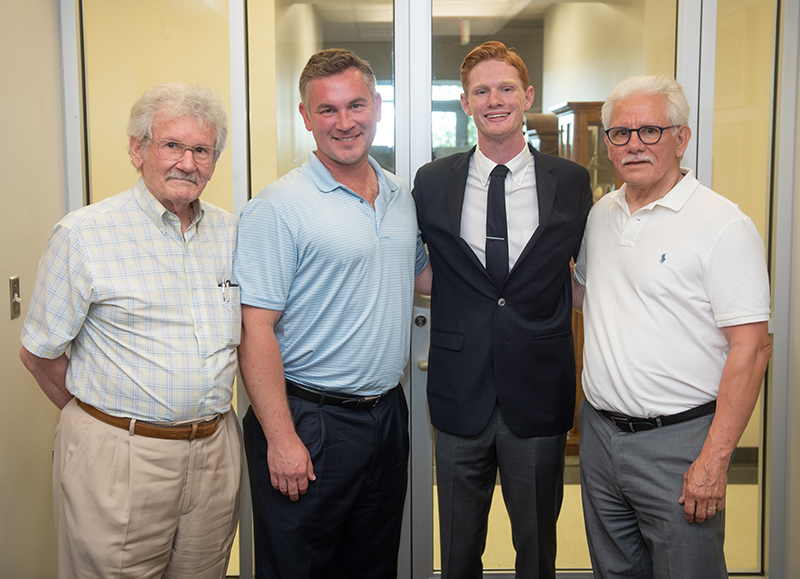A body paralyzed from the chest down from birth proved to be no match for Scott Crouse’s indomitable spirit.
While life in a wheelchair couldn’t touch that spirit, it did affect his body. Small pressure sores that began appearing on Scott’s skin in about 2015 wouldn’t heal. They only got worse.
As the Crouse family learned to their amazement, there is no effective treatment.
“It just overwhelmed him,” says David Crouse, who cared for his ailing son daily in the year leading up to Scott’s death in March 2017 at age 39. “It was so frustrating because it turned out that wound treatment in the 21st century was little different from what was used in the Civil War.”
In Scott’s memory, they have committed to helping researchers at the Wake Forest Institute for Regenerative Medicine (WFIRM) bring wound treatment into this century.
‘Basically Invincible’
Nothing seemed to stop Scott for very long. Because he couldn’t grip a pen or pencil in a single hand, he taught himself how to write using his palms. He refused to use an electric wheelchair, choosing a manual chair until the last year, when deteriorating strength forced him to relent.
“He never wanted you to feel sorry for him. Never,” says Andy Crouse, PhD, Scott’s older brother by two years. “There were times when he wouldn’t park in a handicapped spot because he said that could be for somebody who really needed it. The reality was that he needed it to open the door to his van.”
Scott’s fierce independence inspired family and friends. He had a quick wit, liked video games and displayed wicked poker skills each week with friends who watched as he ran the table. He graduated from Auburn University, earned law and master’s degrees, and practiced law for a time.
David says his son was “basically invincible until this wound situation cropped up.” The family did all they could by limiting pressure on the sites, changing bandages twice a day and seeing a doctor every two weeks. Eventually, the sores led to infections, which led to sepsis.
Scott’s life and his struggle inspired the Crouse family to begin raising money in his memory immediately.
Finding WFIRM
The Crouses wanted to fund the most promising regenerative medicine research into conditions like Scott’s that would help a broad range of patients.

“I told David, ‘We have this place at Wake Forest where they do this research into wound healing,’” says John, now retired. “‘I’m sure they wouldn’t turn down an offer of a little money.’”
The family came up from their home in Auburn, Alabama, for a tour of WFIRM and met Anthony Atala, MD, the W.H. Boyce Professor, director of WFIRM and chair of urology. Atala and teams of WFIRM researchers are developing replacement tissues and organs while working to speed up the availability of these treatments to patients.
The Crouses Were Thoroughly Impressed
“Meeting Dr. Atala, I can’t imagine anyone who could make you feel more welcome,” Andy says. “He’s so easy to talk to, and he’s responsible for all of this work. If you have accomplished all that he has, you don’t necessarily have to be approachable. He’s one of the kindest people with whom you could ever speak. He really cares.”
A Perfect Match
In WFIRM, the Crouses say they have found the perfect match for their philanthropic vision. Their initial gift established the Scott Crouse Family Fund for Regenerative Medicine. So far, the fund has supported two students in WFIRM’s annual Summer Scholars Program for undergraduate college students.
Under the supervision of leading scientists at WFIRM, students spend 10 weeks working on projects in such fields as biomaterials, cell and molecular biology, physiology, biomedical engineering, controlled release systems, biochemistry, cell and gene therapy, and tissue engineering.
James Bennett, a senior biomedical engineering major at Bucknell University and the 2019 Crouse Summer Scholar, met the family on the program’s research day. His project focused on 3D printing of skin tissue for improved wound-healing treatments, and he has presented some of his research at the 2019 Biomedical Engineering Society Conference.
“What happened to Scott was very tragic,” says James. “We have all these advanced technologies for treating heart or lung diseases, but when we’re treating skin—the largest organ—we really are lacking.
“To have the same standard of practice of reduction of pressure and application of dressings for these nonhealing chronic wounds for decades is just inappropriate. To be able to help develop bioprinted skin and research other methods for treating these types of wounds makes me feel like I’m contributing to the medical field.”
The Crouses feel likewise. They say they won’t stop until there is a 21st century solution to wound problems that is widely available, and they believe WFIRM can provide it.
“Scott was the most ethical, moral, black-and-white kind of person,” David says. “He would’ve wanted this money to go to something useful. We’ve checked every box with this investment.”
